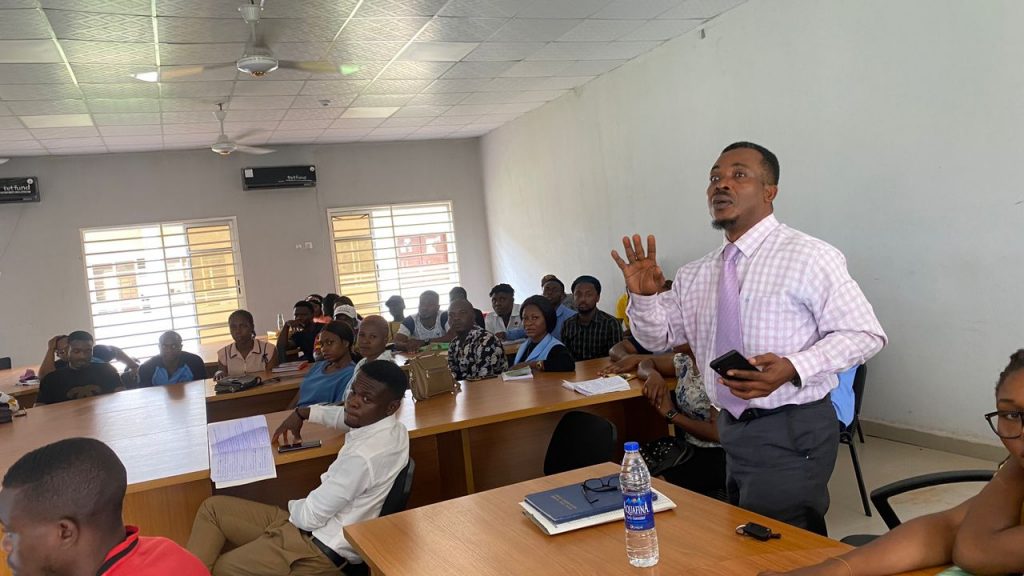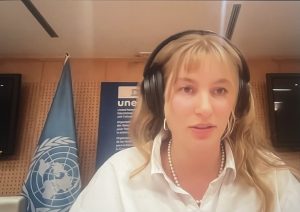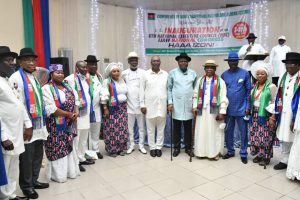Date:
March 18 – 23, 2024
Venue:
Overview
New York
The Conference on “Security System Governance: Confronting Democratic Diminution and Lawlessness” seeks to deepen the understanding of participants on the intersection between peace, rule of law, and strong institutions. Participants will explore the potentials of security governance towards peace and justice in the face of the growing backsliding of democracy in many countries including the United States. The conference is expected to feature speakers that will highlight the urgent need for policy makers and security operatives to understand how rapid, unregulated urbanization, unemployment, injustice, inequality, poor amenities, and climate threats affect state security and stability in many countries of the world. The conference seeks to address security challenges of different fragile democracies and identify effective governance strategies that could stem the trend towards undemocratic practices and disregard for law and order in several regions of the world. Empowering law enforcement and security professionals with advanced global best skills in security system governance and strategies will significantly enhance their ability to address crisis situations with precision, empathy, and diplomacy.
The conference speakers and trainers include renowned experts in human capital development, public relations, conflict resolution, diplomacy, and human rights. The conference will feature interactive workshops, insightful discussions, and practical case studies, offering participants valuable tools and strategies to interrogate and navigate through complex crisis scenarios.
Regardless of your background, the ability to lead and supervise people, communicate effectively, and understand the wheels of government are all valuable skills. In particular, the training opportunity will provide government officials with best practices on strategic communications.
Learning Focus:
Through interactive lectures, hands-on workshops, case studies, self-assessments, and other experiential learning opportunities, participants will explore the dynamics of information sharing amid the growing misinformation and disinformation in a changing political and economic landscape. The curriculum balances debate and analysis with structured opportunities for reflection and personal development to ensure that participants become architects of change. The weeklong training is designed to provide insights into global trends, reputation management, decision-making, building partnerships, and good governance protocols.
This intensive, interactive, and participatory program will use fresh, actionable, and inspiring leadership content from a world-class faculty from New York and New Jersey. The program will add direct value and sharpen your ability to predict how emerging global governance, technologies, and competitive forces affect policy formulation in different countries. The ultimate measure of effectiveness for leaders is the ability to sustain superior results over an extended period.
Session Topics will include:
Gender Mainstreaming for Leadership and Peace Building
Finding Women’s Public Voice
Freedom and progress are not born from silence. This session is expected to help women around the world tell their stories and share experiences with audiences far beyond their borders. Only by making their voices heard, advocating their causes, and expressing their opinions can women become full participants in society.
Women, Leadership, and Entrepreneurship
Women’s participation and engagement in public affairs could have far reaching impact on reforming public administration including government, parliament, the judiciary, media, business, and nonprofit sectors. Increased representation of women in public institutions and decision-making bodies, and genuine aspirations of women all over the world are pivotal to changing the status of women in all societies. Women now own more than 9 million U.S. firms, but women continue to launch businesses with significantly less capital than men and face more obstacles to raising venture capital funds. What are the roles of private and public sectors in encouraging more women to launch their own businesses?
Engaging Women in Peace and Security Process
Women have potential to influence mainstream policy decisions on peace and security. Often, the society does not represent the views of women in the formal conflict prevention process, reconstruction, and peacebuilding efforts. Participants will learn historical roles of women in peacebuilding as well as future potential for success in conflict prevention, management, and resolution. Panelists will review women’s role in reinvigorating policies and priorities around peace, reconciliation, and family stability.
Leadership and Management in Changing Security Environment
Leadership & Management – Learn to harness the leadership skills, political resources, and cultural understandings needed to guide successful organizational change.
Personal Leadership – As a leader, you need to know how to inspire others, direct others, change others, influence others, and turn others around at times of adversity.
Problem Solving, Decision Making, and Innovation – The ability to make effective and timely decisions is an essential skill for successful executives.
Leading Change in Complex Times – As a participant in this program you will learn frameworks that are grounded in research and demonstrated through classroom conversations, exercises, group work, case studies and a software-based business simulation.
Public Performance Measurement – tools for assessing government efficiency and effectiveness.
Financial Security: Exploring What Works – Participants will learn: How to make money work better; Find and save money; and Understand investments and build wealth
Reputation Management –
Organizations now operate in a landscape rife with new threats to their reputations. Equipped to do battle with large competitors, they may be caught unawares by small-scale adversaries in command of a surprisingly potent new-media and social network arsenal: blogs, tweets, text messages, online petitions.
Strategic Communications and Persuasion in the Digital Age –
Session is designed to help executives and managers become successful communicators in person and in virtual contexts: from group discussions to presentations to social media. Advancements in technology and the rapid proliferation of digital media, data analytics, and online collaboration require executives to lead their organizations with sophisticated communication skills, adapted for these new ways of working.
Politics, Public Policy, and Ethics
The leadership environment creates ethical choices that can be hard to think through clearly. Learn how to effectively engage diverse stakeholders towards positive solutions.
Policy analysis – understanding and reporting government plans and actions, including budgets.
Journalism and Government – the relationship between media and the bureaucracy, and strategies for promoting transparency.
Political Culture – understanding the cultures of participants’ home countries.
Fundamentals of Business Communication
This session focuses on communication skills expected of public affairs professionals in business and government sectors.
Participants who successfully complete this course will be able to produce clear, concise, evidence based, argumentatively sound, and persuasive professional communication of various types. The course will emphasize the importance of being purposeoriented and audienceaware. Examples of work to be done include writing emails, drafting business memos, creating executive summaries, producing strategic reports, and crafting other types of internal and external business communication.
Why get a CMPI Executive Education?
An Executive Certificate is a formal recognition of your professional development and commitment to continuous learning. An Executive Certificate allows you to further your knowledge and skills with diverse professionals from different backgrounds. The certificates are offered in multiple areas of concentration, providing executives with the opportunity to tailor their education plans to meet their own specific interests and business goals. Participants are expected to bring unique leadership challenges and develop solutions in a group setting.
Who should Attend?
Public Relations Officers, Law Enforcement Executives, Women Leaders in Public and Private Sectors, Marketing Communications Specialists, Media Chief Executives, Senior Information Officers, Civil Society Leaders, Corporate Affairs Officers, and Managers from Government and business organizations.
Benefits of Executive Education Certificate Program
In addition to networking and the knowledge gained at the programs, participants who have earned an Executive Certificate will receive:
• Updates on faculty research, new programs, and University initiatives
• Membership in the Executive Certificate Network Group on LinkedIn
• Participants will benefit from a guided tour of New York City landmarks
What is the Cost of Executive Certificate Education?
The cost of participation at the international forum is as follows:
1. Tuition fees-$2500/person
2. Accommodation: $300/day- Optional
3. Feeding. $150/day-Optional
4. Visit to Tourist centers: $334/person- Optional
About Center for Media & Peace Initiatives (CMPI):
Center for Media & Peace Initiatives (CMPI) New York, a media and policy think tank in special consultative status with the United Nations’ Economic and Social Council – ECOSOC and affiliated with the Rutgers University’s School of Public Affairs and Administration.
As an organization committed to communicating innovative and peaceful solutions to global challenges, CMPI is an established leader in intellectual development of individuals at all levels. With a great reliance on its extensive international network, the center operates as a facilitator and partner in a wide variety of training projects, publishes and disseminates significant public policy and communication scholarship and advances leadership development through meaningful research, teaching, and service.
The Center for Media and Peace Initiatives brings people and ideas together in a variety of events and platforms to promote and celebrate interdisciplinary study and underline its importance. CMPI continues to engage in many cross-sectoral projects across the United States and Africa, including those engaging journalists, diplomats, business leaders, students, academics, scholars, and public policy experts. CMPI’s unique platform facilitates discussion around specific subject areas, with the goal of generating new knowledge and understanding, forging, and expanding new international, intercultural, interdisciplinary research networks, and partnerships.






















